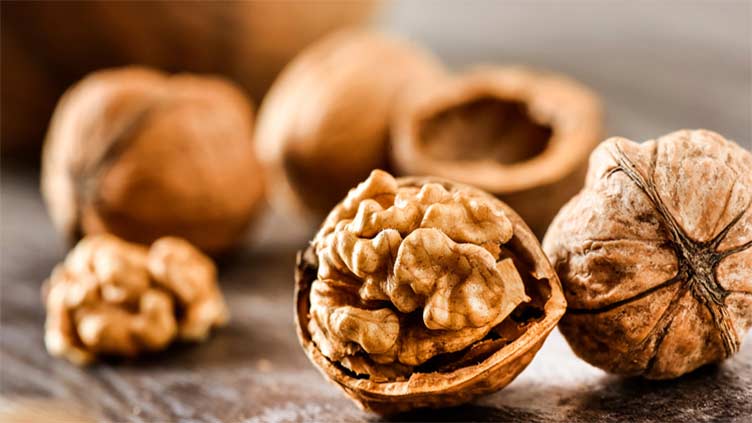Walnuts for heart health: Effect on the gut may be key

They conducted their study by analyzing the genetic expression of microbes in participants.
ISLAMABAD, (Online) - While scientists know that certain foods improve heart health, there are many questions remaining, such as how this happens, and what other foods exist that may lower cardiovascular risk.
Researchers from Texas Tech University in Lubbock and Juniata College in Huntingdon, PA, wanted to learn more about how walnuts may benefit the heart, and whether that starts in the gut.
They conducted their study by analyzing the genetic expression of microbes in participants who either did or did not consume a diet with walnuts.
The study results were presented at Discover DMB, which is the annual meeting of the American Society of Biochemistry and Molecular Biology.
Heart health: Quick facts
According to the Centers for Disease Control and Prevention (CDC), heart disease is the leading cause of death in adults in the United States. Nearly 700,000 people die from heart disease each year.
Many factors influence heart health, and an important one is nutrition. People who follow diets that are high in fat and cholesterol are more likely to develop conditions that can eventually lead to heart disease.
To help reduce the risk of heart disease, people can choose diets that are low in fat, feature lean meats, and are low in sugar and salt.
Avoiding processed foods or foods high in trans fats can help as well.
Some heart-healthy foods the National Institutes of Health (NIH) recommend people consume include:
• vegetables
• fruits
• whole grains
• fish and lean meats
• nuts.
Recent research shows that walnuts, in particular, can improve a person’s cardiovascular disease risk profile.
The role of the gut microbiome
A healthy gut microbiome is imperative to good health. The gut microbiota is a group of microorganisms that colonize the gastrointestinal tract. Some estimates suggest that there are 1,013 bacteriaTrusted Source in the human gastrointestinal tract, about as many as human cells in the body.
Sometimes illness or lifestyle choices can cause changes to the gut microbiome and make bad bacteria outweigh good bacteria.
The NIH note that “[t]he gut microbiome plays an important role in human health and influences the development of chronic diseases ranging from metabolic disease to gastrointestinal disorders and colorectal cancer.”
There are ways to improve gut health, such as taking probiotic supplements to rebalance the gut microbiome. Foods people can eat to help with this include yogurt, pickled vegetables, and kombucha tea.
What the new study did
The researchers who conducted the current study were interested in how walnuts impact gut health and improve heart health.
Walnuts have a higher alpha-linolenic acid (ALA) content, which is significant because ALA may impact neurological and cardiovascular health.
The researchers analyzed data from 42 participants for this study. The participants all had an elevated risk for cardiovascular disease.
All participants initially followed a traditional Western diet for 2 weeks. According to the researchers, their nutritional breakdown included a 50% carbohydrate intake, 16% protein, and 34% fats.
The scientists took stool samples to analyze the participants’ gut microbiomes, and then placed the participants in one of three groups.
The first group, which was called the “walnut diet group”, consisted of participants who ate 57–99 grams (g.) of walnuts per day — roughly 1 cup of walnuts.
The second group consumed the same amounts of omega-3 fatty acid alpha-linolenic acid present in walnuts without eating walnuts. This was the “matched walnut control diet.
The third group was assigned to supplement ALA with oleic acid — while not eating walnuts — and was referred to as the “oleic acid replaces ALA in diet without walnuts” group.
At the end of the 6-week diet periods, the researchers collected stool samples from the participants and analyzed the samples with metatranscriptomics “to investigate the gut microbiota composition and functionality.”
Walnuts, heart health, and the gut
After collecting stool samples, the researchers conducted a genetic analysis of the gut microbiota from each group. They were able to determine whether there were higher or lower levels of certain bacteria.
The researchers found higher levels of Gordonibacter bacteria in the walnut diet group. This bacterium is responsible for metabolizing plant compounds.
The researchers also saw higher levels of gene expression in pathways involved with the amino acid L-homoarginine in the walnut diet group.
This is significant because people with low homoarginine levels are at a higher risk for heart disease.
Additionally, they found that the participants saw improvements in their dysbiosis index values — the ratio of bad bacteria to good bacteria — after spending 6 weeks on their diets.
While the participant pool for the study was small, the results suggest the possibility of improving one’s risk for cardiovascular disease by making dietary changes that impact the gut.
Mansi Chandra, an undergraduate researcher at Juniata College who will present the study, commented on it in an interview with Medical News Today.

